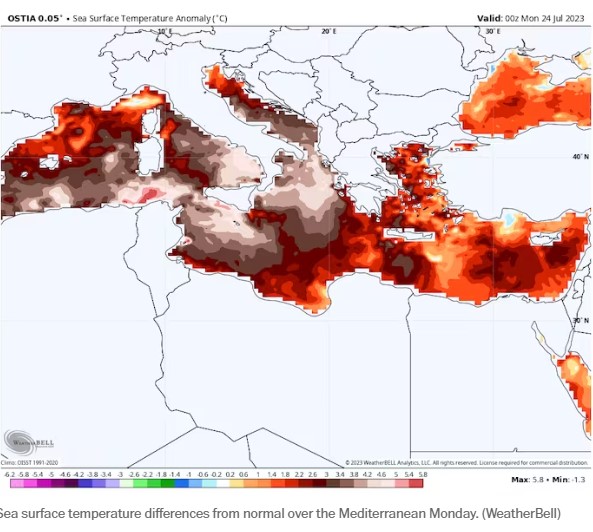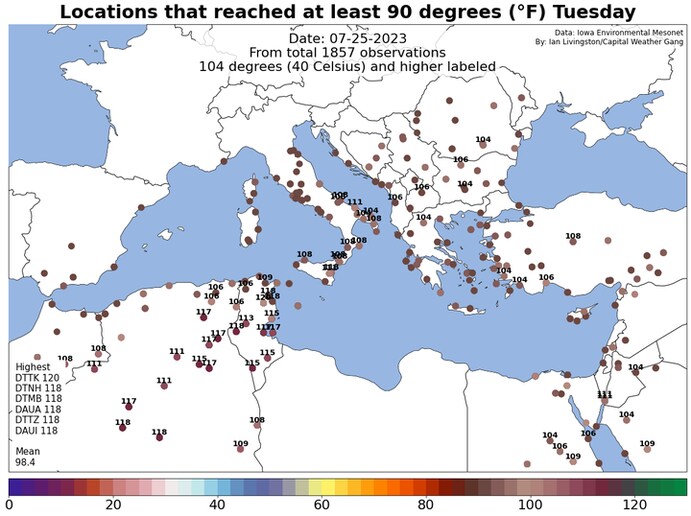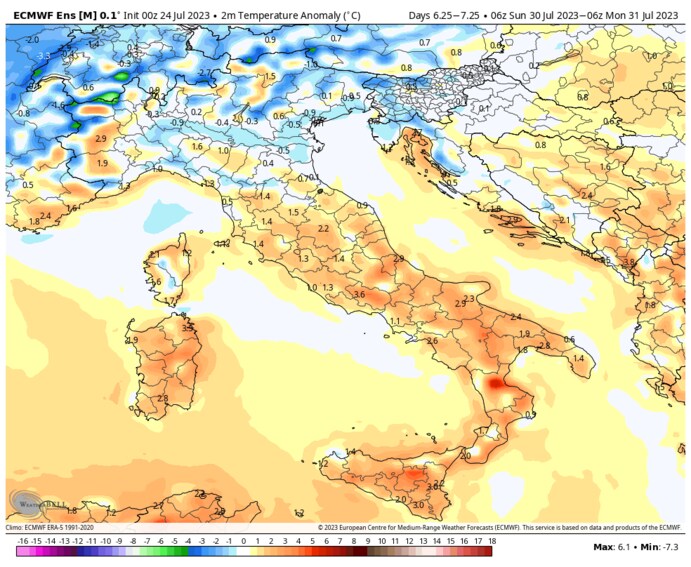Albania hits all-time high as heat blasts southern Europe and fires rage

Europe provisionally hit its July high temperature record Monday, when the island of Sardinia soared to 118.4 degrees.
One of the worst heat waves on record in Greece and southeast Europe is coming to a sweltering finish, during which temperatures have set all-time highs in Albania and northern Greece, as well as tying a European record for July.
On Tuesday, Kuçovë in west-central Albania soared to 111.2 degrees Fahrenheit (44C), the country’s highest temperature on record if confirmed. This follows the mercury hitting 118.4 degrees (48C) Monday on Sardinia, Italy’s second-largest island, marking the highest temperature ever observed in Europe during July.
Violent storms tear through Europe with ‘gargantuan’ hail in Italy
These records come at the end of an unforgiving heat wave that has persisted for more than two weeks in Greece, Italy and much of surrounding southern Europe, as well as northern Africa. The heat has pushed ocean waters in the Mediterranean to their warmest level on record, averaging 83.1 degrees (28.4C).

The excessively high temperatures over land have swamped hospitals with heat sicknesses, closed tourist attractions and fueled massive wildfires.
Major blazes continue to roar in several areas, including through the countryside near Athens. Over the weekend, 19,000 tourists and residents fled the Greek island of Rhodes, the largest fire evacuation in the country’s history.
In Algeria, dozens of fires have killed at least 34 people.
The heat — intensified by human-caused climate change — and the fires are linked, according to a recent study. “[T]he prevalence and extremity of fire weather has already emerged beyond its preindustrial variability in the Mediterranean due to climate change,” said the study, published in Reviews of Geophysics.
Although there’s a break in the heat moving eastward across southern Europe this week, which will reach Greece and surrounding countries by Wednesday, the relentlessly hot weather pattern is poised to surge back next week.
The heat so far
Tuesday

Temperatures were slightly cooler than expected in parts of Greece so Athens did not threaten all-time records as predicted. Still, highs were still near 104 degrees (40 C) in many spots. In northern Greece, the high of 105.4 degrees (40.8 C) in Florina set an all-time record for the region, according to weather historian Maximiliano Herrera.
In Albania, in addition to the national record being breached in Kuçovë, all-time highs were set multiple other cities.
The mercury climbed as high as 120.4 degrees (49.1 C) in Tunisia, where several all-time records were set, Herrera tweeted.
Monday
Monday was another scorcher across southern Europe, especially in Italy and Greece, and southward into North Africa.
The mercury topped out at a historically hot 118.4 degrees (48 Celsius) in Jerzu, on Sardinia’s eastern side. If confirmed, it would be the highest temperature in July in all of Europe, according to Herrera.
Multiple other locations on Sardinia reached at least 117 degrees (47.2C), including Decimomannu on the south coast and Olbia in the northeast.
In Sicily, readings surged near and past 110 degrees (43.3C). Palermo, on the north coast, reached 116.6 degrees (47C), setting an all-time high. It beat the previous record by over 3.6 degrees (2C).
The capital of Tunisia, Tunis, saw afternoon readings at least as high as 120 degrees (48.9C) at Tunis Carthage International Airport. Widespread temperatures of 110 to 120 degrees smothered the entire region. 100 (37.8C)-to-110-degree readings also extended eastward into Turkey.
Sunday
On Sunday it was a similar story, with temperatures of 90 degrees (32.2 Celsius) or higher draping from Spain to southern France, then eastward across Italy through Greece and toward Turkey. This was a slight expansion northward from Saturday, which also showed a similar temperature pattern.
Greece and Italy both reached at least 115 degrees (46.1C) Sunday. Algeria’s capital of Algiers climbed to 119.7 degrees (48.7C) on Sunday, setting an all-time record. The town of Kairouan rose to 120.2 degrees (49C), a record for July there.
Punishing heat baked this same region much of last week, too. Some locations in Greece and southern Italy have witnessed high temperatures of at least 100 for most of or all of the last two weeks.
“We will probably go through 15 to 16 days of a heat wave, which has never happened before in our country,” said Kostas Lagouvardos, director of research at the National Observatory of Athens, told CNN.
What’s ahead
Although a break from the heat is right around the corner, parts of Eastern Europe and western south Asia may see some of their hottest weather yet through Wednesday and Thursday.
There’s an outside chance the highest temperature ever observed in Europe could be threatened. That’s 119.8 degrees (48.8C), which was observed in Syracuse on the Italian island of Sicily during August 2021.
By Wednesday, when cooler air arrives in the western part of southern Europe, the core of the heat will shift east into Bulgaria, which could see highs around 115 degrees (46C), near the national record. Extreme heat will also persist in eastern Romania, much of Greece and Turkey before being squashed further south on Thursday.
As this week closes, much of eastern and southern Europe will experience a rare and welcome run of temperatures near or even below average for several days. That kind of weather has largely been bottled up in northern Europe in recent weeks.
But in southern Europe, the break will probably be short-lived. Hot weather from North Africa is set to head back northward during the upcoming weekend, and then hover over southern Europe next week. For now, the intensity does not appear as great as the ongoing wave, but it is still quite hot.

Part of a worldwide trend
The heat in Europe comes as much of the Northern Hemisphere is locked into extreme heat patterns that have been slow to budge in recent weeks. Emerging research suggests that human-caused climate change may be causing the jet stream to become more sluggish, favoring prolonged heat waves.
Inside the most extreme heat wave the Southern U.S. has faced
In 2022, more than 60,000 people may have died in heat waves across Europe amid the continent’s hottest summer on record.
Jason Samenow contributed to this report.






